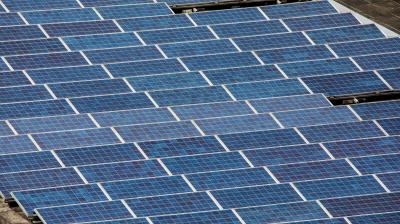The energy transition is no longer only important to fight climate change, but it has become a geopolitical necessity and a security issue, argue Louise van Schaik and Giulia Cretti.
Louise van Schaik is head of unit for EU and global affairs at the Clingendael Institute of International Relations in the Netherlands. Giulia Cretti is a research fellow at Clingendael.
Energy security and the geopolitics of transitioning away from fossil fuels took center stage at the Munich Security Conference, the premium gathering on international security.
The risks of depending on fossil energy from petrostates, critical raw materials and nuclear power value chains are undeniable concerns because dependencies can and have already been weaponised. To boost strategic autonomy in the energy field, the EU needs to accelerate green tech leadership, develop a credible hydrogen market and cooperate in a mutually beneficial way with more countries.
For decades, Europeans have cultivated relations with petrostates misled by the belief that energy dependencies can foster cooperation between producing and consuming countries. The agreement on Nord Stream 2 marked the apex of this liberal understanding championed by the Germany of Angela Merkel.
The European energy crisis that followed the Russian invasion of Ukraine proved that this system does not work and that energy can be used as a weapon. This liability stretches beyond Russia since the EU imports fossil energy from many other countries that are autocratic.
Fossil dependencies can quickly switch into critical weaknesses that make Europe more vulnerable to leverage and external shocks.
Rents of oil and gas exploitation are often used to finance wars, oppression and even bribery of European politicians, as happened in Qatargate.
More recently, European energy security has been directly affected by the Houthi attacks in the Red Sea, which have almost halved Qatar’s LNG cargoes to European markets, with possible impacts on the price of gas. The yellow vest movement in France and turmoil in Kazakhstan at the start of 2022 are mere illustrations of how high fuel prices can operate as catalysts for protests.
But beggars can’t be choosers.
In order to move away from Russian gas supplies, Europe had to engage in new fossil energy deals which locked in dangerous dependencies. Options proved limited, with the preferred supplier, Norway, unable to meet the demand.
The EU, moreover, accelerated its domestic climate and green industrial policies and budgets, which deserves respect. Yet, they are also rightly being criticised for being rather costly and bureaucratic in their set-up, compared to, for instance, the US Inflation Reduction Act.
While the security imperative is used to promote green energy partnerships with third countries by the EU and its Member States, like Germany, it is also used to justify domestic exploration of oil and gas, for instance, in the UK. At the same time, the US has become a more important fossil exporter to the EU, especially with LNG, but its reliability may be reconsidered after the presidential elections in November.
Another concern is the supply of the critical raw materials (CRMs) needed for Europe’s energy transition, for which the dependency on China is noteworthy. This is a different dependency since the materials are not used only once to produce energy (like fossil fuels) but instead used for products that generate, store, and transport energy. Still, the degree of reliance expected demand increase and the lack of incentives to find alternatives or recycle CRMs are tremendous challenges.
In the run-up to the European elections, the energy crisis is somewhat less on the radar. European citizens take the availability of cheaper fossil energy for granted again. Instead of considering the still ongoing risks of fossil fuel dependencies and huge overall costs associated with importing oil and gas, debates highlight the costs of climate policy and energy transition.
Voices of vested interests in the fossil economy are keen to emphasise the necessity of private sector buy-in in energy transition. Their rhetoric also stresses the risks of de-industrialisation and CRM dependencies, as well as technological feasibility related to energy infrastructure.
Most recently, farmers’ protests have overtaken the streets in various European countries and are voicing concerns over EU climate policies. While their fear of not being able to compete in global markets is understandable, they could also look for synergies to link green industrial investments to innovation of food production in Europe.
Just like the Carbon Border Adjustment Mechanism is levelling the playing field for the industry by making foreign polluters pay when entering the European market, new ways could be envisaged to reduce unsustainable competition in agriculture. Like coal regions, rural areas and their farmers could be assisted more in the field of sustainability.
Overall, Europe is better off taking the clean energy path rather than staying in a costly and polluting fossil fuels system dominated by petrostates and vested interests. The energy transition is no longer only important to fight climate change, but it has become a geopolitical necessity and a security issue.
Accelerating the transition is key to reaching independence from Russia and other fossil exporters. Stepping up the pace will enhance energy security and will highlight the EU’s position as a geopolitical actor, green tech leader, and a standard-setter for the global energy transition.
This op-ed was originally published by Euractiv






